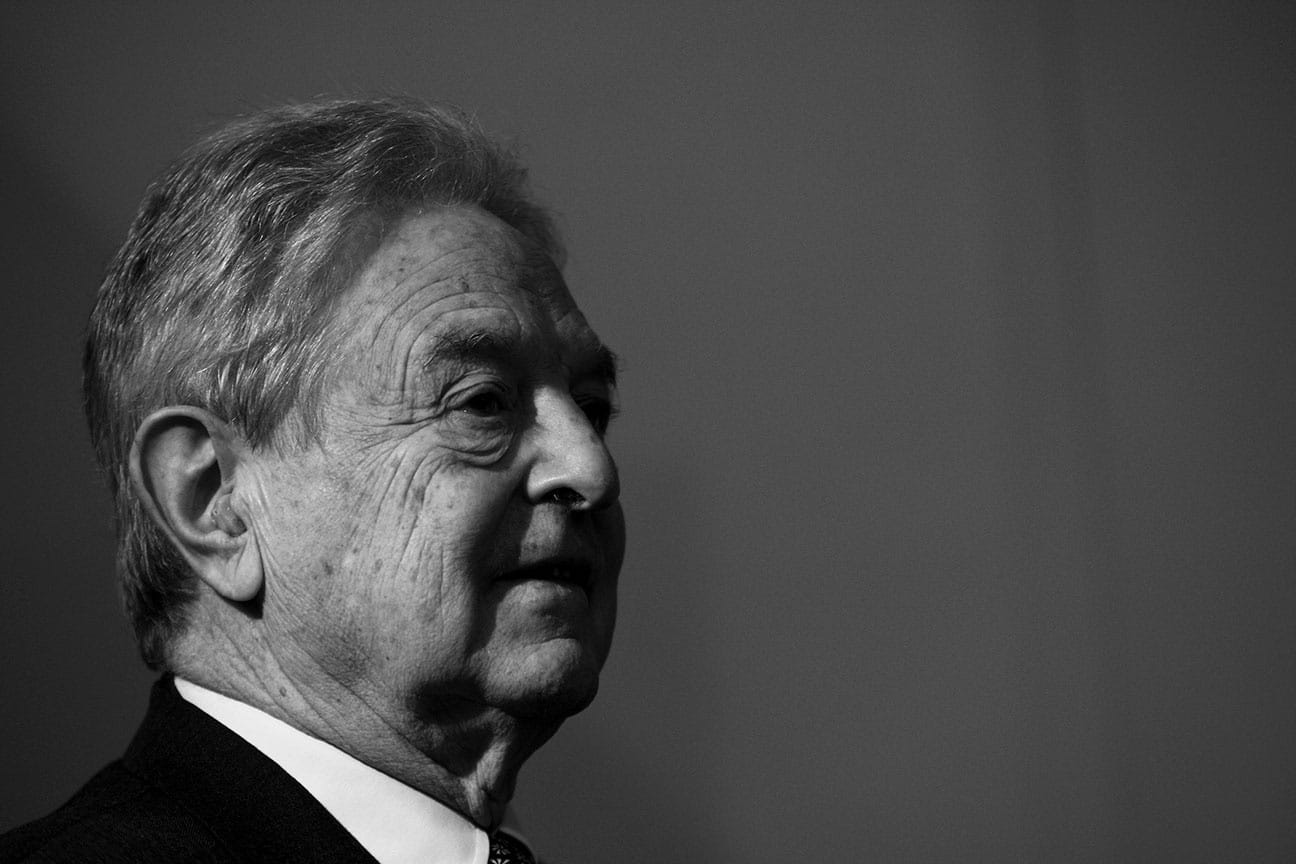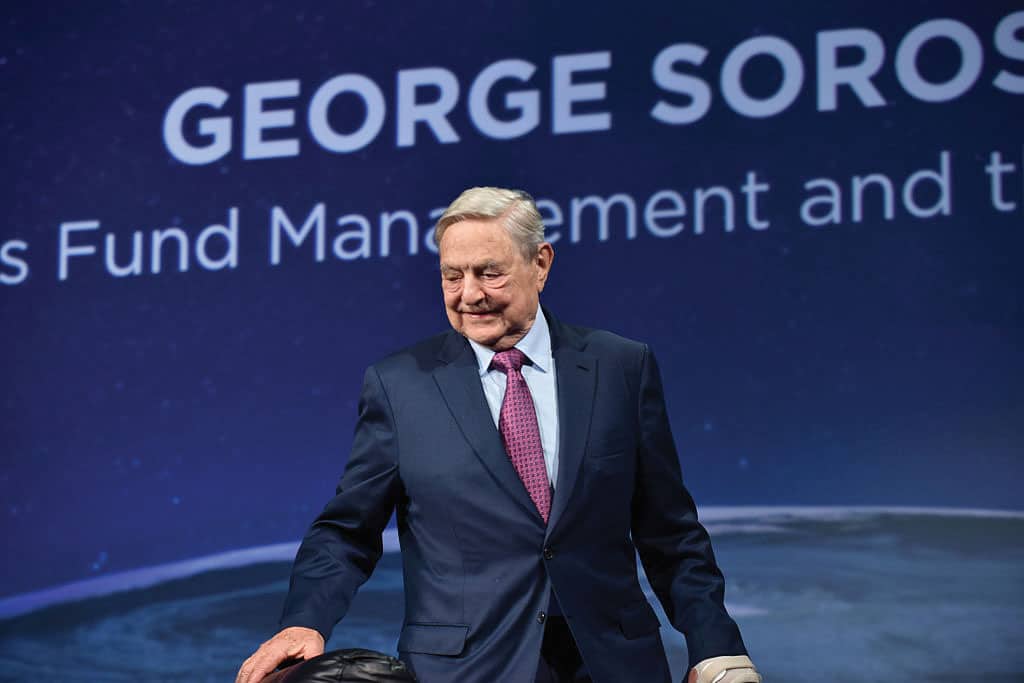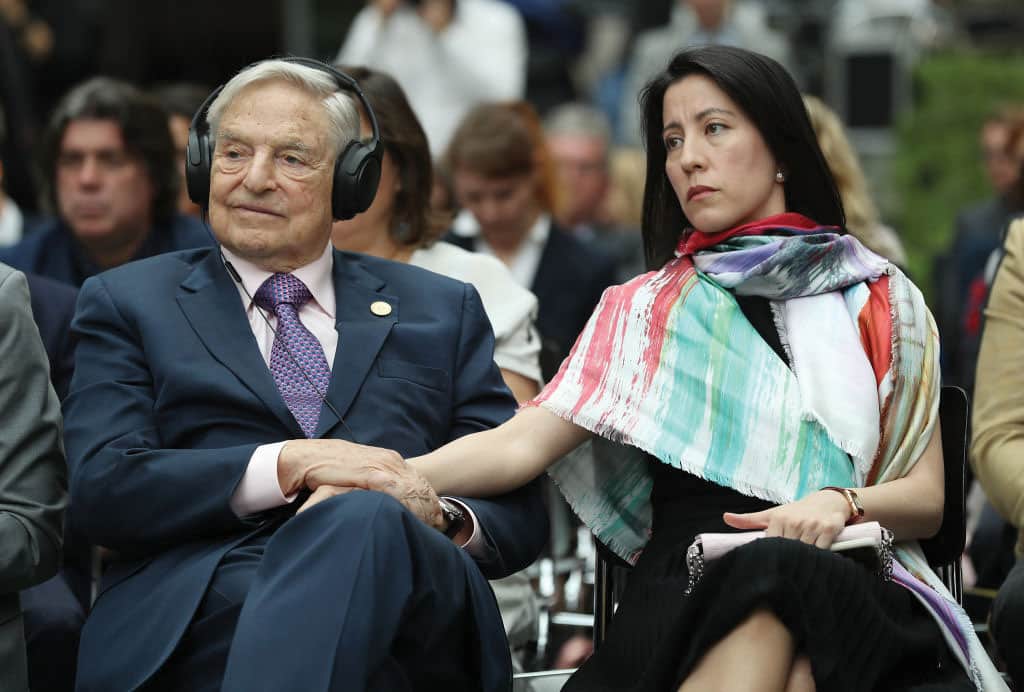 (Photo by Miguel Villagran/Getty Images)
(Photo by Miguel Villagran/Getty Images) Israel’s Diaspora Minister Amichai Chikli and the US Special Envoy to Monitor and Combat Antisemitism Deborah Lipstadt recently squared off, not over settlements or terrorism, but over a 92-year-old billionaire whose wealth is only rivaled by his controversies.
And that quickly spun off into a civil war within the Israeli Foreign Ministry.
It was not the first time that Jews (and non-Jews) have fought over George Soros: a Hungarian Holocaust survivor, and a London and New York City financial whiz kid, whose third act was to build an international political network with offices from Nairobi to Berlin.
There is perhaps no nonagenarian so deeply involved in the debates of our time as George Soros. The governments of India, Hungary, and Israel, among others, have recently criticized the political philanthropist, while others, including France, embrace him. The divisions are just as stark among liberals and conservatives in the United States, and among Jews who either hate him or love him.
The American Jewish Committee describes Soros as a “Jewish symbol” while super-lawyer Alan Dershowitz took to The Wall Street Journal to argue that “the Hungarian-born billionaire has done more than anyone to turn Americans against Israel.” David Friedman, Trump’s ambassador to Israel, famously described Soros among the “great enemies of the Jewish people and the State of Israel” while an op-ed in The Forward contended that, “Netanyahu’s Hatred of Soros Is A Rejection of Diaspora Jews.” Jewish conservatives even recently launched an organization, “Jews Against Soros.”
The argument is nearly as old as Soros himself.
At a YIVO dinner 20 years ago, while presenting an award to a Holocaust survivor, Soros remarked that Jews had gone from victims during the Holocaust to perpetrators in their treatment of the Palestinians.
“If I’d been there — and you can quote me — I would have walked out,” Elie Wiesel told The Forward.
Soros, whose political activity and philanthropy come as a result of decades of work as a successful financier, has not been derailed by these criticisms. Since 2004 he has donated steadily to the Democratic Party and, since 2022, has been the largest donor to Democratic campaigns. In California, his interest in criminal justice reform led him to put $1.5 million behind DA George Gascon and provided $1 million to help Gov. Newsom fight recall efforts even though he appears to have no homes in the state.
In California, his interest in criminal justice reform led him to put $1.5 million behind DA George Gascon and provided $1 million to help Gov. Newsom fight recall efforts even though he appears to have no homes in the state.
Little wonder that Democrats love him and Republicans hate him. As Donald Trump faces charges over the conduct of his 2020 presidential campaign, the former president and his supporters have found a familiar political scapegoat: George Soros. As Manhattan DA Alvin Bragg’s indictment of Trump loomed, Trump allies accused Bragg of having been bought by Soros. (Soros’ Open Policy Center is a major donor to the Color of Change campaign; Color of Change donated $500,000 and endorsed Bragg’s 2022 campaign for Manhattan DA. For his part, Bragg says he has never met Soros.) Indeed, calling any initiative “Soros-funded” has become a label of opprobrium for many on the political left, the right and elsewhere.
Calling any initiative “Soros-funded” has become a label of opprobrium for many on the political left, the right and elsewhere.
His Open Society Foundation (OSF), which he has funded for decades, has offices and agendas that sweep across the globe. It has built kindergartens in Albania, advocates for LGBTQ rights in the Philippines and works to legalize coca growing in Bolivia. It also, according to B’nai Brith Canada, has provided support to BDS groups targeting Israel.
The scope of the Soros philanthropy has stirred praise and resentment around the world. And Jews have mixed feelings about the Jewish billionaire, much as he does about them.
The scope of the Soros philanthropy has stirred praise and resentment around the world. And Jews have mixed feelings about the Jewish billionaire, much as he does about them.
But going back to his childhood casts light on the ambiguous place that Soros occupies among Jews.
Soros was born in 1930 to a well-to-do family in Budapest, then part of the Kingdom of Hungary. A visitor to Budapest today is struck by its grand cafes and famed spas. The city was and still is home to a rich architectural heritage, including both Austrian and Ottoman structures that still stand, as well as one of the most beautiful synagogues in Central Europe. At the time of Soros’ birth, Budapest had a thriving Jewish population of roughly 200,000, or nearly one-quarter of the capital city’s population.
George’s father Tivadar was a well-known lawyer, born into an Orthodox Jewish family, while his mother Erzsébet had a general interest in mysticism that would eventually lead her to convert to Christianity.
Tivdar imbued his son with an early sense of internationalism and a largely secular Jewish upbringing, although Soros did have a modest bar mitzvah shortly before World War II engulfed Budapest.
“My mother was quite antisemitic, and ashamed of being Jewish. Given the culture in which one lived, being Jewish was a clear-cut stigma, a disadvantage, a handicap — and, therefore, there was always the desire to transcend it, to escape it,” Soros described.
The family had changed its last name from Schwartz to escape antisemitism. But adopting Hungarian names only went so far. The family survived the Holocaust due to personal connections to the Hungarian regime that allowed them to obtain false papers.
Hiding out while posing as a Christian, Soros learned to go to church with his mother. They would cross themselves in front of churches. After surviving both Nazi and Communist rule, Soros made his way to London. He rose from railway porter to nightclub manager and used his earnings to fund his studies at the London School of Economics.

Soros was also comfortable on the soapbox. He was known to visit Speaker’s Corner in London’s Hyde Park and harangue small crowds about Esperanto speaking in both English and Esperanto.
If the nightclub was for profit, for Soros the soapbox was for fun. This was his first moment in the public eye. Even today one can see a bit of soapbox showmanship in his public speeches.
At the London School of Economics, Soros encountered the work of Austrian philosopher Karl Popper whose 1945 work, “The Open Society and Its Enemies,” would inspire the name of his philanthropic network: the “Open Society Foundation”. Popper’s central contention, drawing heavily from Aristotle, is that human frailty ensures humans can never fully understand the truth but only an imperfect version.
This sort of thinking heavily influenced his strategy as a financier. Soros’s financial career at a London office of Hungarian-owned brokerage began in 1955. Popper’s principles coincided perfectly with international arbitrage. The price of a commodity in one country could be slightly different in another.
Like Popper, Soros both supported and despaired of the free-market. “I try to be a winner as a market participant and to serve the common interest as a citizen and a human being. Sometimes it is difficult to keep the two roles separate,” Soros wrote in his 1999 book “The Crisis of Global Capitalism.”
Soros moved to the United States in 1956, the same year the Soviet Union brutally crushed the Hungarian uprising. There he had little time for the soapbox, as he plunged into the high-stakes world of finance. He married a German immigrant and began a family with her.
But while George Soros had left behind Hungary and the Jews, he could not entirely escape the shadow of the past. “The assimilationist Jews of Hungary had a deep sense of inferiority and it took me a long time to work through that,” he later revealed.
When his first marriage fell apart, the middle-aged wealth maven married a Jewish woman and began a new family. After decades of escaping his Jewish past, Soros could be seen posing with his son Alex holding a Torah scroll at his Bar Mitzvah. It is this son, Alex, now 37, to whom the billionaire has turned over control over his political network after passing over his oldest sons who had been born to a German woman.

“As other members of my family remained in a kind of hiding, continuing to conceal their identities, I decided to get a bar mitzvah,” Alex Soros revealed.
Alex, who is much more identifiably Jewish, the founding chair of Bend the Arc Jewish Action, a liberal PAC, promises a more political, but also a more Jewish role for OSF.
But that hasn’t made the Soros role within the Jewish world any less ambiguous.
The Soros name is so controversial in some quarters that J Street, the liberal Israel lobby group, states on its website that, “George Soros very publicly stated his decision not to be engaged in J Street when it was launched — precisely out of fear that his involvement would be used against the organization.” An expose in The Atlantic later accused the organization of misleading journalists about the sizable amounts of money that Soros had donated.
“President Obama, at one point, had to distance himself from Soros because of Soros’ views on Israel,” the magazine observed. Soros, a major donor, later described Obama as, “my greatest disappointment.”
To many, Soros is a philanthropist who is changing the world for the better, while to others, his Open Society Foundation is nothing short of a cabal toppling governments. Bombs have been sent his way and a militia group was reportedly training to kill him. But it is among Jews that his legacy has been especially mixed. And while George Soros has responded to his international critics, he has done little to engage with the Jewish community.
When former Malaysian Prime Minister Mahathir Mohamad launched an antisemitic attack on Soros, the billionaire responded by suggesting that, “I’m also very concerned about my own role because the new antisemitism holds that the Jews rule the world … I also contribute to that image.”
At a 2003 event, Soros argued that “There is a resurgence of antisemitism in Europe. The policies of the Bush administration and the Sharon administration contribute to that.”
Despite the outsize role that Soros plays in both the Jewish and the antisemitic imagination, his focus has never been Israel. While he has funded a number of organizations hostile to Israel, his philanthropy had its full flowering in Hungary.
In his native Hungary, Soros founded the Central European University (CEU) in 1991, following the collapse of the Soviet Union and the Warsaw Bloc. Soros envisioned an institution similar to the London School of Economics. However, the rise of Prime Minister Viktor Orbán changed the calculus for the university. After clashing with Orban’s government, the university announced plans to shift its U.S.-accredited programs to Vienna.
The Open Society Foundations closed its office and relocated to Berlin. Among the issues at stake was the OSF’s support for refugees and asylum seekers.
“It was George Soros who portrayed himself as the greatest opponent of Prime Minister Viktor Orbán in the first place, and not vice versa,” Zoltán Kovács, a secretary of state and spokesperson for the government of Hungary, said in a written interview with the Journal. “The aim of the law was also to create effective social control of foreign-funded NGOs supporting illegal migration, and … would have made it possible for the public to know clearly which organizations have interests in changing the composition of Hungary’s established permanent population and influencing Hungarian migration policy.”
A ruling of the Court of Justice of the European Union (ECJ) on November 16, 2021 challenged some parts of the laws. Kovács reiterated his governments respect for the ruling, noting that his government reserved the “right to take action against foreign-funded NGOs, including any activities by organizations funded by George Soros seeking political influence or promoting migration. Hungary’s position on migration has not changed: Hungary will not become an immigrant country, help should be given at the location of the problem instead.”
Kovacs stressed that Budapest is home to Central Europe’s largest Jewish community and a thriving one at that. “Governments led by Prime Minister Viktor Orbán have done more than any other to oppose this kind of hateful prejudice and to provide meaningful support to Hungary’s Jewish community. The current government also passed some of the most far-reaching provisions in Europe to punish Holocaust denial, hate speech, and the display of hate symbols.”
Inescapably, the debate over George Soros comes down to Jewish issues. Other billionaires are associated with a particular brand, but Soros is unique in that his success as a philanthropist outshone his business acumen in the eyes of the public. And yet it has made him no less a target for criticism and for debates over whether that criticism is antisemitic.
Predictably, perhaps, Soros’s massive funding of progressive organizations has made him a magnet for antisemitic attacks. Recently, billionaire Elon Musk commented on Twitter: “Soros reminds me of Magneto” and followed it up by saying that Soros “hates humanity.” Magneto is a Marvel Comics villain who also happens to be a Holocaust survivor.
Predictably, perhaps, Soros’s massive funding of progressive organizations has made him a magnet for antisemitic attacks.
The tweet was denounced quickly by various Jewish groups and politicians, including Jonathan Greenblatt of the Anti-Defamation League, who said: “Soros often is held up by the far-right, using antisemitic tropes, as the source of the world’s problems. To see Elon Musk, regardless of his intent, feed this segment — comparing him to a Jewish supervillain, claiming Soros ‘hates humanity’ — is not just distressing, it’s dangerous.”
“Why are so many prominent Jews defending George Soros — a virulent anti-Zionist who has never been friendly to the Jewish people,” Dershowitz asked. “Every Jew should condemn antisemitic and illegitimate misuse of Soros’s Jewish heritage. But this misuse should not prevent or deter legitimate criticism of Soros’s individual influence on the world, not as a Jew but as a super-villain in his own right.”
Countless hours spent debating with family or friends in Budapest or Hyde Park have given Soros a thick skin. One former business colleague of Soros, who spoke to the Journal on the condition of anonymity, said that Soros “understands sometimes you just cut your losses and move on.” This radical, stoic acceptance aided his rise as a sober financier. He rarely responds to his critics, the least of whom are the conspiracy theorists who use his name for self-aggrandizement.
He rarely responds to his critics, the least of whom are the conspiracy theorists who use his name for self-aggrandizement.
But the argument still goes on. And Jews continue to argue over where to draw the line. For some, the phrase “Soros-funded” is really a polite form of antisemitism. But while his allies, employees and Jewish son have made that argument on his behalf, George Soros has claimed that he inspires antisemitism, but not claimed to be a victim of antisemitism because that would run counter to his beliefs.
“I don’t think that you can ever overcome antisemitism if you behave as a tribe, he concluded in an interview with The New Yorker. The only way you can overcome it is if you give up the tribalness.”
At the age of 92, he has done a great deal to overcome that tribalness and yet there is more antisemitism than ever not only in the world, but in his life. Despite his funding of pro-BDS groups, the BDS movement had announced a targeted boycott of him when he invested in Israel’s Sodastream. Disavowing a tribal Jewish identity and Israel has not dissuaded the antisemites on any and all sides of the political spectrum.
“I realized the impact of the attacks on my identity that occurred when I had to deny my Jewishness and live under false pretenses,” Soros had confessed.
Is George Soros still living under false pretenses? Soros is not the only Holocaust survivor who has a conflicted relationship with the Jewish people, but he may be one of the most famous ones because he operates on the world stage. And Jews, in America, Israel and around the world may be just as conflicted about Soros as he is about them.
“I don’t deny the Jews their right to a national existence — but I don’t want to be part of it,” he once commented.
And yet George Soros has never been able to escape being a part of Jewish life. At the age of 92, foreign leaders and the Jewish community continue to debate the Soros legacy.
Joseph Hammond is a Los Angeles-based journalist, who has spent more than a decade of reporting internationally, including from the Congo, Sri Lanka, Rwanda, Iraq, Egypt, and Somalia.






















 More news and opinions than at a Shabbat dinner, right in your inbox.
More news and opinions than at a Shabbat dinner, right in your inbox.